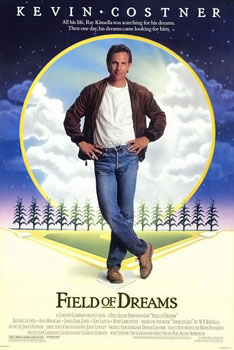Writer-director Phil Alden Robinson, adapting effectively W. P. Kinsella’s novel, “Shoeless Joe,” turned Field of Dreams into a commercially popular, Oscar-caliber movie–and a cultural phenom due to its many quotable lines.
| Field of Dreams | |
|---|---|

Theatrical release poster by
|
|
Grade: B+
The nominal narrative is rather simple; it’s the subtext that makes it more touching and memorable.
Iowa farmer Ray Kinsella (Kevin Costner) hears a voice one day saying, “If you build it, it will come,” prompting him to build a baseball diamond in his cornfield so that he can make peace with his dead father.
The ghost of Shoeless Joe Jackson (Ray Liotta) shows up, followed by other players who were disgraced at the 1919 Black Sox World Series scandal (the subject was dramatized in John Sayles’ 1988 movie, Eight Men Out).
Is the movie Capracorn or Capraesque?
The answer to that question would depend on your values and the kind of movies you like.
In 1989, some viewers perceived it as a magical experience, offering a rare glimpse at the vastness, goodness, and grandeur of Middle America.
Now-a-days, American movies tend to be so cynical, reflecting paranoia, disillusionment and mistrust, that Field of Dreams is almost refreshing in its simplicity and naivete. It’s a film without any cynicism, whose enjoyment depends on the uncritical receptivity from its viewers.
The interaction between Costner and the ghost recalls such classic films, as the 1950 Harvey, in which James Stewart communicated with a six-foot rabbit that was only visible to him.
In addition to Kostner, who renders a most credible performance, the strong supporting cast includes Amy Madigan as his wife, Burt Lancaster, and especially James Earl Jones, who delivers a powerful speech about how baseball once reflected America, disregarding the racial segregation and discrimination against Black actors that prevailed at the time.
Though soaked with a rather basic Freudian psychology, the scene of Costner’s reconciliation scene with his dead father is extremely moving; it reportedly affected strongly young men in similar position to Costner to reach out to their dads, who they might have neglected or abandoned.
In 1989, the picture touched many people in the same way as Frank Capra’s Depression era fables, evoking nostalgia for simpler, more innocent times.
A mystical fantasy about belief and hope for magic in the the most mundane life, Field of Dreams offers a meditation that suggests how to regain passion for life while maintaining one’s conscience and identity intact.
A uniquely American film (that indeed didn’t play as well in foreign countries), Field of Dreams was typical of many other 1980s movies in its peculiar blend of traditional and countercultural values.
The film’s sentimental premise struck a chord and the movie became a surprise box-office hit, defying Hollywood’s more conventional wisdom that sports and baseball movies are not particularly commercial.
Detailed Plot
Ray Kinsella is a novice Iowa farmer who lives with his wife Annie and his daughter Karin. In voice-over narration, which begins the film, Ray explains how he had a troubled relationship with his father, John Kinsella, a devoted baseball fan. While walking through his cornfield, Ray hears a voice that whispers, “If you build it, he will come.”
Ray continues to hear the voice before seeing a vision of a baseball diamond in his field. Annie is skeptical of his vision, but she allows Ray to build the field. Months pass by, nothing happens in the field, and Ray’s family faces financial ruin.
Karin then spots a uniformed man in the field, who, Ray discovers, is Shoeless Joe Jackson, a deceased baseball player idolized by Ray’s father. Thrilled to play baseball again, Joe asks to bring others to play on the field. He later returns from the cornfield with the seven other players banned in the 1919 Black Sox scandal.
Ray’s brother-in-law, Mark, who can’t see the baseball players, warns Ray that he’ll go bankrupt unless he replants his crops. While in the field, Ray hears the voice again, urging him to “ease his pain.” After attending a PTA meeting about banning books by the radical author Terence Mann, Ray decides the voice is referring to him.
A magazine interview reveals Mann’s childhood dream of playing for the Brooklyn Dodgers. Ray tracks him down in Boston and persuades him to attend a game at Fenway, where Ray hears the voice urging him to “go the distance.”
The scoreboard shows statistics for a player named Archibald “Moonlight” Graham, who played one game for the New York Giants in 1922, but never had a turn at bat.
Ray and Mann travel to Chisholm, Minnesota, where they learn that Graham became a doctor and died years back. During a night walk, Ray finds himself in 1972 and encounters the then-living Graham, who states that he moved on from his baseball career and enjoys his medical career. He declines Ray’s invitation to fulfill his dream.
However, while driving back to Iowa, Ray picks up a young hitchhiker who introduces himself as Graham. While Archie sleeps, Ray reveals to Terence the details of his falling out with his father, after an argument in which Ray denounced Shoeless Joe as a criminal. At the farm, more players have arrived to field two teams, and Archie finally gets to bat.
The next morning, Mark returns and demands that Ray sell the farm. Karin says that they won’t need to sell because people will pay to watch the ball games. Terence agrees that “people will come” to relive their innocence, and Ray refuses to sell. Frustrated, Mark scuffles with Ray, accidentally knocking Karin off the top of the bleachers. Archie runs to help and, stepping off the field, becomes the old “Doc” Graham.
After reassuring Ray that his true calling was medicine, Graham shakes hands with the players and leaves. Suddenly able to see the players, Mark urges Ray not to sell the farm.
Shoeless Joe invites Terence to enter the cornfield. He rebukes Ray’s desire for a reward, reminding him why he sacrificed so much: “If you build it, he will come.” The catcher removes his mask and Ray recognizes his father as a young man. Shocked, Ray now understands that “Ease his pain” referred to his father, but Joe counters that the voice referred to Ray himself.
Ray introduces his father to Annie and Karin and asks his father to have a catch. As they play, hundreds of cars approach the field, fulfilling Karin and Terence’s prophecy that people will come to watch baseball.
My Oscar Book
Oscar Context:
Field of Dreams was nominated for three Oscars: Best Picture, Robinsons adapted screenplay, and James Horners original score. James Horner.
It lost the Best Picture to Driving Miss Daisy, which also won the Oscar for Alfred Uhrys screenplay.
The score award went to Alan Menken for The Little Mermaid.
Cast
Kevin Costner as Ray Kinsella
Amy Madigan as Annie Kinsella
James Earl Jones as Terence Mann
Ray Liotta as Shoeless Joe Jackson
Burt Lancaster as Dr. Archibald “Moonlight” Graham
Timothy Busfield as Mark
Frank Whaley as Archie Graham
Gaby Hoffmann as Karin Kinsella
Dwier Brown as John Kinsella
Fern Persons as Annie’s Mother
Credits:
Directed by Phil Alden Robinson
Screenplay by Robinson, based on the novel “Shoeless,” Joe by W.P. Kinsella
Produced by Lawrence Gordon, Charles Gordon
Cinematography John Lindley
Edited by Ian Crafford
Music by James Horner
Production: Gordon Company
Distributed by: Universal
Release date: April 21, 1989 (US)
Running time: 106 minutes
Budget $15 million
Box office $84.5 million












